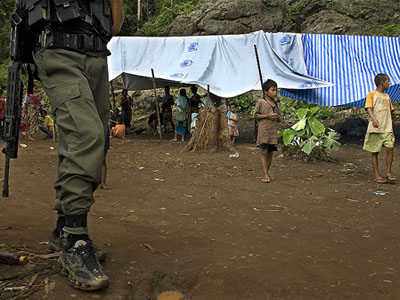Following an international statement last week calling for the Burmese government to allow immediate humanitarian access to an impoverished Rohingya refugee camp in Arakan state, US-based international watchdog Human Rights Watch (HRW) on Tuesday released a report in which it called on Thailand’s authorities to take greater care of Rohingya boatpeople and to take punitive action against any officials found complicit in smuggling operations.
Noting that many children had been separated from their parents while in detention in Thailand, HRW called for the Thai government to reunite Rohingya children and their families in “safe and open family shelters”.
The report noted that many of the boats which arrive on Thai shores carry unaccompanied Rohingya children.
“Rohingya children need safe, secure environments after fleeing violence in Burma and enduring the trauma of difficult journeys,” said Alice Farmer, children’s rights researcher at HRW. “Yet Thailand locks up many who reach its shores, leaving them vulnerable to trafficking and further abuse.”
Chris Lewa of the Arakan Project, an NGO that defends Rohingya rights, confirmed that it was general practice for Thai immigration officials to separate male and female boatpeople when processing them.
“Some children become unaccompanied in government shelters as their male relatives are kept in immigration detention centres,” she said.
“Indefinite detention is not a solution, in particular for children, and alternatives should be found,” said Lewa.
HRW said that new research indicates abuses by Thai authorities and called for punishments against officials found complicit in such cases.
The report follows a recent in-depth article by news group Reuters which accused Thai naval immigration officials of involvement in the trafficking of Rohingya boatpeople to Malaysia.
“Thousands of Rohingya have passed through one of at least three ‘trafficking camps’ in southern Thailand, where some have been held for ransom or sold to fishing boats and farms as manual laborers, according to Reuters and other media reports in December 2013,” read the HRW report.
“The reports allege that Thai immigration officials collaborated with the traffickers by transferring Rohingya held in Thailand to the custody of the traffickers,” the report said. “A high-ranking police official confirmed to journalists the existence of the camps and acknowledged an informal policy called ‘option two’, which relies on smuggling networks to expel Rohingya migrants, including asylum seekers, from Thailand. The United Nations has called for an investigation into the reports Thai immigration officials moved refugees from Burma into human trafficking rings.”
HRW went on to say that if the Burmese government refuses to accept the return of stateless Rohingya migrants, the Thai government should release them as “there is no legitimate reason to detain people solely for immigration violations who cannot be repatriated”.
No Thai immigration authority could be reached for comment when contacted by DVB on Tuesday.
Thai naval immigration authorities reacted to the Reuters report in December by filing a defamation suit against a local website, Phuketwan, which ran coverage of the alleged smuggling operation and which has routinely published details of Rohingya boatpeople washed up on Thai shores.
Speaking to DVB on Tuesday, Phuketwan editor Alan Morison said the investigating officer in the case has said he is compiling a summary for the public prosecutor in mid-January.
Morison said that despite calls by international media and human rights groups to withdraw the charges, the commander of the Thai naval authority refuses, saying that the Phuketwan report has damaged Thailand’s image.
Meanwhile, Morison said, reports continue to surface of Rohingya boatpeople arriving in Phuket and other locations in southern Thailand, apparently en route to Malaysia to find work.
Phuketwan reported that 139 Rohingya Muslims arrived on Phuket on 25 December, and Morison said that two further instances of boats carrying perhaps 200 migrants each from Burma (or Bangladesh) had been reported this week.
The cool season in Southeast Asia from October to February dictates calmer seas and is usually the time when Rohingya and other would-be migrants take to the high seas in boats, after paying brokers to transport them to Malaysia.
According to Chris Lewa of Arakan Project, November saw the highest number of Rohingya boatpeople recorded to date.
“Some 9,000 Rohingya left from only northern Arakan state in November 2013,” she said, noting that her NGO estimates that between 65,000 and 70,000 Rohingya fled persecution in northern Arakan state over the past year, and that those figures did not include other ports of exit such as Sittwe, where Arakan Project has no data.
Lewa said that most Rohingya currently pay a fee of between 100,000- 200,000 kyat (US$100- $200) to a broker before leaving Arakan state, but must then pay an additional fee of 65,000- 75,000 baht (up to $2,500) to smugglers in Thailand.
On 30 December, the US, the EU, Switzerland and Turkey issued a joint-statement saying that the “international community” is deeply concerned by the dire humanitarian situation faced by Rohingya IDPs in Taung Paw camp in Myebon Township.
Noting that the deteriorating living conditions in the camp have created an inhumane environment for camp residents, the statement said that the 752 families living in the camp have faced “very poor living conditions, including lack of safe drinking water, limited healthcare services, malnutrition, and restrictions on movement outside the camp” for the past 14 months.
It further added that the international community has received credible reports that local community members in Myebon have harassed relief workers and impeded the access of humanitarian supplies to the camp.
“These actions are unacceptable,” the joint-statement read, and called for the Burmese authorities to ensure greater security for and access to the camp’s displaced Rohingya.
In February last year, UN Special Rapporteur Tomas Ojea Quintana remarked after a visit to Taung Paw that it “felt more like a prison than a camp”.













